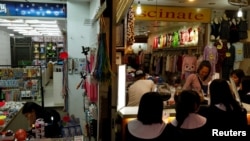Political tension between China and Taiwan has affected cooperation on safety standards leading to a large number of cosmetic and food imports being stopped from entering China, the head of China's quality watchdog said on Tuesday.
China deems Taiwan a wayward province to be taken back by force if necessary, though proudly democratic Taiwan has shown no interest in being ruled by autocratic China.
China is deeply suspicious of Taiwan President Tsai Ing-wen, who took office last May, believing she wants to push for the island's independence, a red line for Beijing. Tsai says she wants to maintain peace with China.
Beijing has cut off official communication with Taipei because Tsai has refused to accept China's view that the island is a part of China, and has put pressure on the trade-reliant island diplomatically and economically.
China's quality chief Zhi Shuping told reporters on the sidelines of China's annual meeting of parliament that, although cosmetic and food imports do not account for a large percentage of China's imports from Taiwan, a large number of imports of those products were substandard.
"Originally we had lots of cooperation, but now certainly it has been obstructed. Some information is not as smooth as it had been in the past," Zhi said, referring to the period after Tsai took office.
Things would get better if Taiwan recognized the "1992 consensus", he said.
The "1992 consensus", agreed with Taiwan's previous China-friendly Nationalist government, acknowledges Taiwan and China are part of a single China, but allows both sides to interpret who is the ruler.
"Communication would be a lot smoother," Zhi said. "We all belong to one China, and blood is thicker than water."
Defeated Nationalist forces fled to Taiwan in 1949 after losing a civil war with the Communists.
Some Taiwanese companies also don't really understand China's standards, Zhi said, and Taiwan's own quality standards have weak points and loopholes.
"We give feedback on each batch, but rectification is not good enough," he said.
"We treat everyone in the world the same when it comes to safety. Brothers are brothers, but principles are principles.
Just because you're a brother doesn't mean we make things easier for you," he Zhi said.
There have been repeated safety scandals over made-in-China goods, from tainted baby milk formula and rotten meat to fake rice and toxic toothpaste, unsettling consumers around the world, including in Taiwan.








